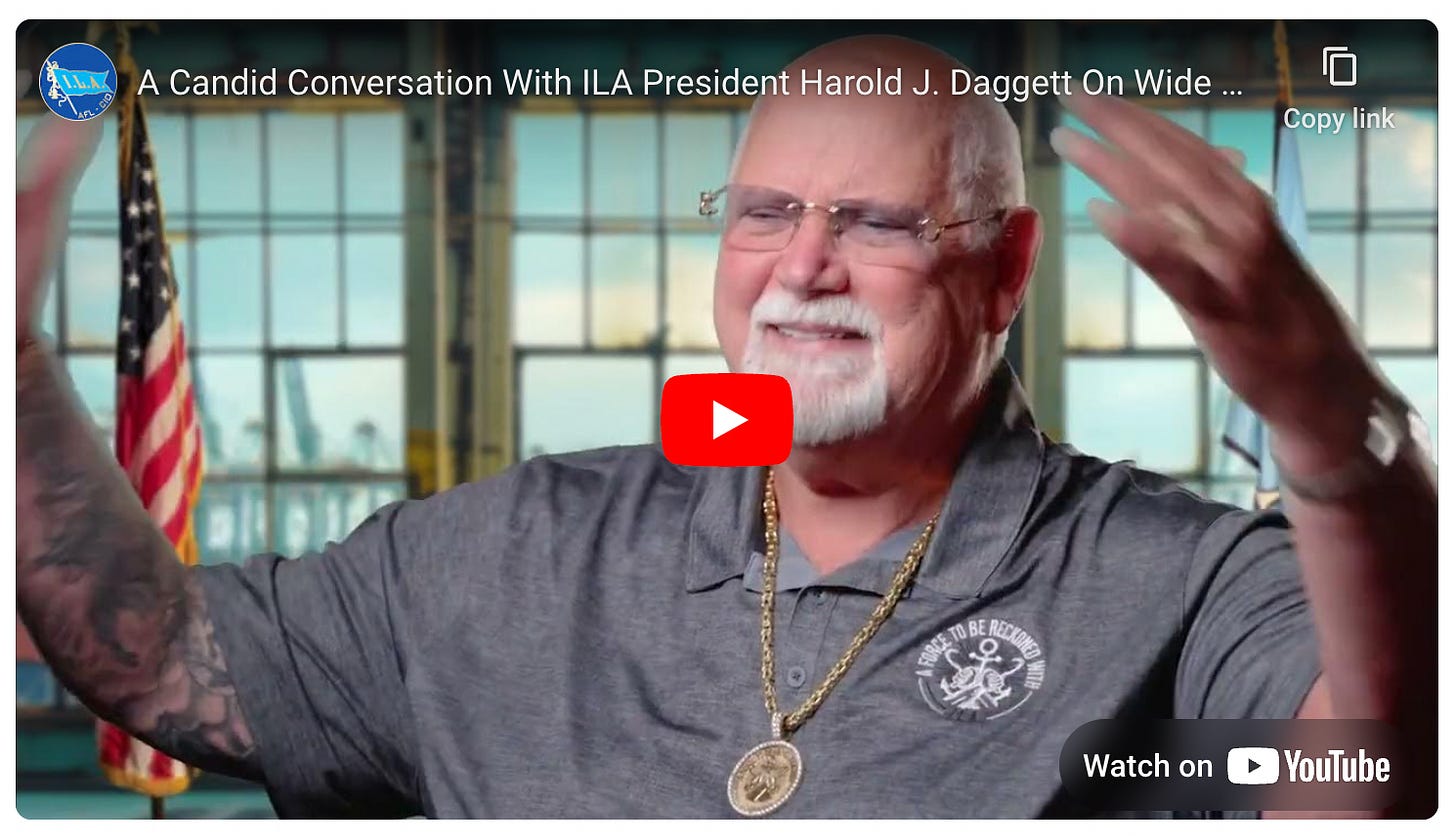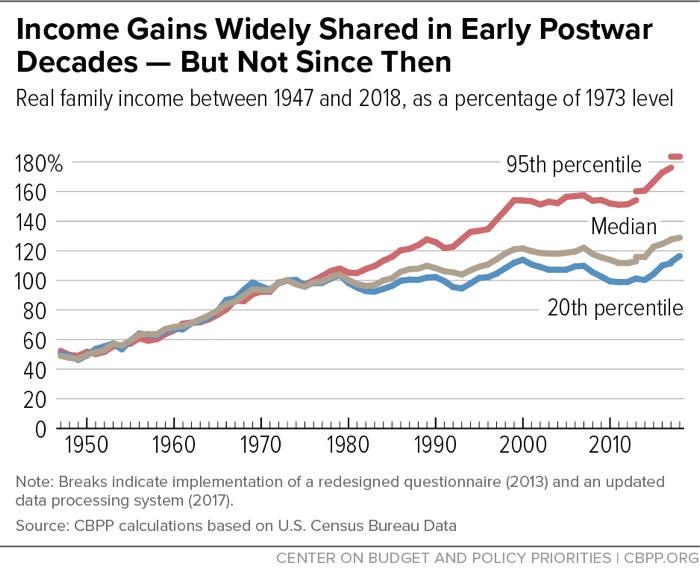my first post in the Wasteland. inspired by ’s waste notebook idea, this is my “shit blog”. in his words, “the waste book has become a sort of writer’s diary / notebook where I talk process and sketch out new ideas in rough form.”1
workers, unite!
"i will cripple you." that’s not a line from a b-movie villain. rather, it’s ILA (international longshoremen’s association) union president, Harold Daggett’s negotiation strategy. welcome to labor relations in 2024, where unions play chicken with the entire U.S. economy. 50,000 dock workers held 43% of U.S. trade hostage, threatening to cost the economy $5 billion a day. after three days of no work, Daggett’s all-in no limit shove worked – a 61.5% wage increase over six years. and that’s why he gets paid the big bucks.
crisis averted, but why did it escalate to the point of this guy threatening massive delays to my amazon packages? the crux of the issue is a classic misalignment of incentives: the US Maritime Alliance (USMX) wants to cut costs and automate dock work; the ILA wants job security and higher pay for its workers. and this contention around the future of work automation isn’t going anywhere when negotiations resume in january 2025.
unions are about collective bargaining where a group of less powerful employees stands up to a more powerful employer. these organizations can help enforce worker protections against the big, bad corporation — higher wages, better benefits, improved working conditions. but, union membership rates are at an all-time low.2 despite having one of the highest per-capita gross domestic products worldwide, the United States also has one of the most unequal income distributions. unsurprisingly, tensions are at a generational high.
if Harold Daggett is right about one thing, it’s this: companies in the USMX like Maersk have made a killing, continuing to increase profitability without providing commensurate compensation increases to workers. this is what we call the widening of the productivity-pay gap.3 is it any surprise that an alarming 77% of American employees are disengaged, aka not really working?4 the prevalence of labor strikes (is america the new europe?) and quiet quitting is telling. stagnant wage growth, higher inflation, increased wealth inequality…it’s clear: capitalism isn’t working for the average person.
here’s a thought… what if instead employer and employee could holistically agree to work towards common goals? that is the idea behind the worker-owned cooperative, where employees don’t just work for the business; they own and manage it democratically. two fundamental principles:
worker members own the business
one worker, one vote
this is what the International Cooperative Alliance has to say about cooperatives:
Cooperatives are enterprises based on ethics, values, and principles. Through self-help and empowerment, reinvesting in their communities and concern for the well-being of people and the world in which we live, cooperatives nurture a long-term vision for sustainable economic growth, social development and environmental responsibility.
i call this cooperative capitalism. imagine uber drivers getting paid stock bonuses or amazon warehouse employees voting on working conditions. not to mention nvidia stock… cap table math aside, is this crazy? apparently not. about 12% of the world’s population is involved in some form of co-op, and the top 300 cooperatives generate $2.4 trillion in revenue each year.5 co-ops are proof that you can build successful enterprises through grassroots inclusiveness and collaboration instead of winner-takes-all greed and top-down hierarchy.
humanity at work
“humanity at work” is the company tagline for the basque-based Mondragon Corporation that flourishes in good times and endures in the bad. it’s a corporation and a federation of ninety-five autonomous cooperatives, with a governance system and collective intentionality designed to protect workers and weather the worst of economic storms — to name a few, the global financial crisis of 2008, the subsequent european sovereign debt crisis in 2009-2010, and most recently, covid-19.
unlike many large corporations that go into “hire fast, fire fast” mode as the economy booms and busts, Mondragon operates on a “hire slow, fire (almost) never” philosophy. case in point: in spring of 2020 when production at Mondragon factories plunged by 75% of normal capacity, they didn’t panic and lay off half the workforce. Instead, they went for a 5% pay cut across the board. that’s right, no mass layoffs. by contrast, America’s unemployment rate shot up from 4.4% to 14.7%. how is this possible?
in boom times, workers enjoy perks like private healthcare, profit-sharing, and pensions. but when the going gets tough, managers, aka executives, reinvest profits into the company to keep jobs secure. instead of throwing dividends at shareholders or stock options at execs, the cooperative focuses on preserving paychecks for its members. every Mondragon co-op chips into a shared fund that covers unemployment benefits and helps out struggling member cooperatives. And when a crisis hits, production may slow, but workers keep getting paid, accumulating hours they can make up later. It’s a radically different approach to navigating economic turbulence, and it works.
last year (2023), the federation brought in more than eleven billion dollars in revenue from operating businesses in banking and insurance, high-tech industrials manufacturing, a large grocery chain, tech R&D centers, and a McKinsey-like consulting firm. While employing over 80,000 employees, there’s one major thing to note: the pay ratio between Mondragon’s top executives and lowest-paid workers: it’s capped at six-to-one. in comparison, american CEOs make nearly 350x that of the employee. here are a few examples of american companies with about 80,000 employees: 3M, Gap, Cisco, Best Buy, and Morgan Stanley. can you imagine the ceo of Gap making 6x the compensation of the retail employee who is folding clothes?
now, Mondragon might be a special case, which
calls a city state, a cooperative that could be its own country.6 it has its own university and its own social communities centered around culinary clubs — an adult version of Princeton’s eating clubs, which embody the dining hall, social houses, and salons. but, it’s also not the only game around town. cooperatives come in many forms, across the globe, across industries. from los angeles strippers to italian wine makers to indian dairy farmers, the key takeaway here is that these types of organizations provide a support system that aligns incentives between owners and workers.noble work
finally, let’s wrap this up by paying homage to (relatively) newly-minted Nobel laureates Daron Acemoglu and James Robinson, whose book Why Nations Fail offers straightforward insight into why some societies thrive and others don’t. They write:
“Nations fail today because their extractive economic institutions do not create the incentives needed for people to save, invest, and innovate. Extractive political institutions support these economic institutions by cementing the power of those who benefit from the extraction.”
what if we applied this to business? stepping back from the cutthroat, “i will cripple you” ethos that defines much of modern capitalism. instead of seeing layoffs and wage cuts as inevitable, what if we embraced inclusiveness in the system? where everyone has a stake in success, socializing risks and rewards.
now, I can already hear the silicon valley bros screaming, "but what about disruption? what about 10x growth?" we’re not talking about throwing capitalism out the window. we’re talking about retooling it. according to capitalist kings, Sam Altman and Vinod Khosla, even the high-class, silicon valley, two-percenter tech worker needs more – more shares and participation in a startup’s upside. they’re saying that these startups should be more employee-owned.
why not take one step further… how about employee-owned and employee-run? In a world that feels increasingly fragile and social tensions are at a boiling point, case studies like Mondragon offer a tantalizing alternative to our current form of capitalism (some call it technofeudalism). who knows? maybe in a few decades (and hopefully, not centuries), we'll look back and realize that the real disruptors weren't the tech unicorns, but the cooperative capitalists that figured out how to make the system work for everyone.
while this is a “shit post”, it was still only made possible with the patient edits and feedback from
, , , Matt’s Newsletter, , . thank you!https://www.henrikkarlsson.xyz/p/having-a-shit-blog-has-made-me-feel




Pretty damn good for a “shit blog.”